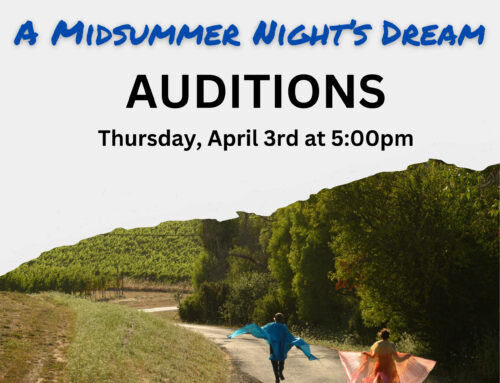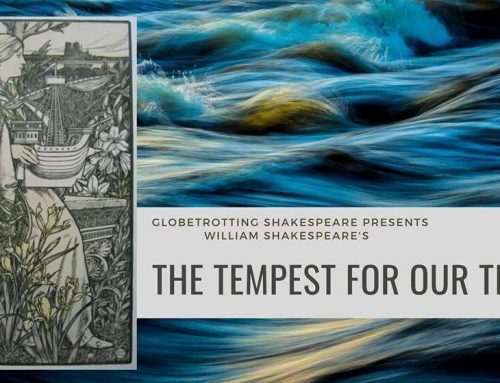Napa Valley College’s Shakespeare Napa Valley presents Shakespeare Sonnet a Week, with local community members and actors performing Shakespeare sonnets.
Week 12 – Sonnet 8
Recited by Dr. Christina Howell, NVC Music Professor.
Week 11 – Sonnet 104
Recited by Colin Chan
Recited by Fernando Espinoza in Spanish
Sonnet 104
Week 10 – Sonnet 43
Ray Jacildo recites Shakespeare Sonnet 43
Recited by Bailie
Sonnet 43
When most I wink, then do mine eyes best see,
For all the day they view things unrespected;
But when I sleep, in dreams they look on thee,
And darkly bright, are bright in dark directed.
Then thou, whose shadow shadows doth make bright,
How would thy shadow’s form form happy show
To the clear day with thy much clearer light,
When to unseeing eyes thy shade shines so!
How would, I say, mine eyes be blessed made
By looking on thee in the living day,
When in dead night thy fair imperfect shade
Through heavy sleep on sightless eyes doth stay!
All days are nights to see till I see thee,
And nights bright days when dreams do show thee me.
Notes via Shakespeares-Sonnets.com
After the torment and anguish of betrayal, the poet in this and the following sonnets analyses his own disturbed mind and the dark brightness that love has cast upon it. This is a sonnet of antitheses, seeing and not seeing, day and night, shadow and form, dark and bright, dead and living. It is also a poem of absence, and links itself thematically with the next seven sonnets (43-52, excluding 49).
The exuberance with which he uses the language of shadows and forms blunts the biting edge of absence, which otherwise cuts into his heart. Shadows, substance, form and dreams are part of the machinery of Plato’s cave in which the real world is unknown, and only flickering shadows of people cast on the wall of the cave by a sickly light are interpreted as if they were reality. Real form, or essence, was something which only the spiritual eyes, or the eyes of the mind, could see. The theme of shadow substance duality was a common one in Elizabethan literature. Lyly for example frequently mentions it: ‘Well gentlemen, answered Lucilla, in arguing of the shadow we forgo the substance.‘ (Euphues (c.1578). L.Scragg, ed., p.20).
In this sonnet the shadows seem to flicker and in the end one enters a dream world which is as real to the poet as the world of absence from which he strives to escape. The days become nights and nights days, and the natural order of things is inverted and confounded.
Week 9 – Sonnet 50
Brian Lym, Napa Valley College Director of Library Services, recites Shakespeare Sonnet #50.
Kiara Pipino recites Shakespeare Sonnet 50 in Italian.
SONNET #50
How heavy do I journey on the way,
When what I seek, my weary travel’s end,
Doth teach that ease and that repose to say,
‘Thus far the miles are measured from thy friend!’
The beast that bears me, tired with my woe,
Plods dully on, to bear that weight in me,
As if by some instinct the wretch did know
His rider lov’d not speed being made from thee.
The bloody spur cannot provoke him on,
That sometimes anger thrusts into his hide,
Which heavily he answers with a groan,
More sharp to me than spurring to his side;
For that same groan doth put this in my mind,
My grief lies onward, and my joy behind.
Week 8 – Sonnet 56
Week 7 – Sonnet 30
Shakespeare Sonnet 30 Recited by Mayor Jill Techel
Sonnet 30 recited in Spanish by José Sanchez, José Sanchez, Napa Valley College Web Applications Analyst and adjunct instructor.
Week 6 – Sonnet 29
Shakespeare Sonnet 29 recited by Patti Coyle, St. Helena Drama Teacher.
Actor and friend of Shakespeare Napa Valley, Leona Sklenickova, recites Shakespeare Sonnet 29 in Czech.
Week 5 – Sonnet 27
Napa County Supervisor Brad Wageknecht recites Shakespeare Sonnet 27
Napa Valley College math professor, Ksenia Kitaeva, recites Shakespeare Sonnet 27 in Russian.
Week 4 – Sonnet 116
Matt and Olivia Cowell recite Shakespeare Sonnet 116.
Prague Shakespeare student, Neha Vyas, recites Shakespeare Sonnet 116 in Hindi.
Production Credit: Zima Blue
Week 3
Performed by St. Helena Mayor, Geoff Ellsworth
Sonnet 18 by William Shakespeare
Napa Valley College Adjunct Faculty of Humanities, Nicolette Morales, presents Shakespeare’s Sonnet #18 in Tagalog.
Week 2
Performed by Chris, Julia, Joey & Bella DeNatale of Napa
Sonnet LXV by William Shakespeare
Since brass, nor stone, nor earth, nor boundless sea,
But sad mortality o’ersways their power,
How with this rage shall beauty hold a plea,
Whose action is no stronger than a flower?
O! how shall summer’s honey breath hold out,
Against the wrackful siege of battering days,
When rocks impregnable are not so stout,
Nor gates of steel so strong but Time decays?
O fearful meditation! where, alack,
Shall Time’s best jewel from Time’s chest lie hid?
Or what strong hand can hold his swift foot back?
Or who his spoil of beauty can forbid?
O! none, unless this miracle have might,
That in black ink my love may still shine bright.
Sonnet LXV in Portuguese
Performed by Napa Valley College student Jefferson Sbrissa
Week 1
Who with his fear is put beside his part,
Or some fierce thing replete with too much rage,
Whose strength’s abundance weakens his own heart;
So I, for fear of trust, forget to say
The perfect ceremony of love’s rite,
And in mine own love’s strength seem to decay,
O’ercharged with burthen of mine own love’s might.
O! let my looks be then the eloquence
And dumb presagers of my speaking breast,
Who plead for love, and look for recompense,
More than that tongue that more hath more express’d.
O! learn to read what silent love hath writ:
To hear with eyes belongs to love’s fine wit.Week 1: Sonnet XXIII in Spanish
Maria Villagomez, Napa Valley College Senior Dean of Language Arts, Library, and Social Sciences, performs Shakespeare’s Sonnet XXIII in Spanish.




